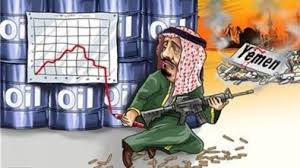A gradual collapse of the Saudi economy
YemenExtra
Saudi Arabia’s annual consumer price inflation jumped to 3% in January after the government introduced a 5% value-added tax and hiked domestic gasoline prices at the start of the year, official data showed on Sunday.
The figures suggested the new tax and more expensive fuel, part of a government drive to cut a big budget deficit caused by low oil prices, had a large impact on Saudi consumer spending power in some areas last month. Consumer prices rose 3.9% from the previous month in January, Reuters reported.
Food and beverage prices jumped 6.7% from a year earlier, restaurants and hotels gained 5.8%, and transport costs soared 10.5%. However, clothing and footwear prices fell 7.9% from a year earlier, partly because of deep discounting by retailers battling a slow economy, while housing and utility prices rose only 1.3%. Residential rents are exempt from the tax, and the Saudi real estate market has been slumping.
The statistics agency changed the base year for the consumer price index to 2013 from 2007 last month and adjusted the basket of goods and services, making direct comparisons with previous months difficult.
But the new tax and higher gasoline prices clearly pushed up inflation sharply. Annual inflation was just 0.4% in December, according to previously released data using the old basket.
Meanwhile, Saudi Arabian shares fell on Sunday as weakness in banks more than offset a rise in petrochemicals after Brent crude oil rebounded to around $67 a barrel at the end of last week.
The Saudi stock index fell 0.4%. Ten of 14 petchems climbed, with the biggest, Saudi Basic Industries, adding 0.6%.
Nine of 12 banks fell. Reuters reported on Thursday about rising Islamic tax liabilities at Saudi banks. In the last couple of weeks, several major banks have disclosed that the government is seeking additional zakat—or alms-giving—payments from them for years going back as far as 2002.
In some cases, the demands exceed half of a bank’s annual net profit, and analysts expect more banks to disclose additional zakat demands in coming weeks.

